Edie Melson's Blog, page 55
April 13, 2024
What SHOULD a Writer Wear?

by Martin Wiles @LinesFromGod
“Don’t take this the wrong way because I don’t mean it ugly, but where do you get your clothes?”
The conversation occurred during one of our teachers’ monthly birthday breakfast celebrations. As I prepared my plate, a teacher from the elementary section asked the question. She seemed hesitant to ask, but I wasn’t offended.
“My wife orders them from Amazon, but I’m not sure what company,” I replied.
The clothes she referred to weren’t my pants, but my shirts. My shirts of choice are flowery, paisley shirts—the kind hippies wore in the 1960s and 1970s. And they match my personality since I am an old hippie.
But the culture wasn’t why I wore them then or now. I had never cared very much what people thought about my attire. As a teen, the only brand names I selected were Levi™ pants and Converse™ tennis shoes. Other than that, I dressed in whatever I liked, whether anyone else wore it or not.
Sometimes, others picked on me because of my clothes, glasses, or hairstyle. I didn’t care. I was pretty much a loner who needed little acceptance from my peers, so peer pressure didn’t pressure me much.
I carried that attitude over into adulthood. Yes, I want to be liked and accepted, but it doesn’t send me into a tailspin when it doesn’t happen. I move on, one step at a time. And yes, I still wear unusual clothes for someone in my profession, as my peer noticed.
My teacher peer and I concluded that my style is “Dr. Wiles’ style.”
People misjudged Jesus’ appearance, too. When he told the religious leaders they were trying to kill him, they told him he was demon-possessed. On another occasion, they accused him of working for Satan when he cast out demons.
That’s why Jesus said, Look beneath the surface so you can judge correctly (John 7:24 NLT).
Outward appearance holds some importance. We want pleasant hygiene so others won’t avoid us and we won’t offend them. And some professions require particular attire—suit and tie, uniform, scrubs, steel-toed shoes.
For writers, that includes writing. If we label ourselves a writer, we must write. But don’t fall into the guilt trap of thinking you must do it daily. Sometimes, life gets in the way, and at other times, our emotions do. But write we must. Regularly. And our stuff with our voice. We can’t copy someone else’s style because then our outward appearance becomes hypocritical—something Jesus sternly warns against.
Nor do you have to write a book to be a writer. Many never do. Plenty of other opportunities avail themselves. And more people will read something else you write than they will your book—unless you are world-renowned. Of course, there’s nothing wrong with writing the book and the something else (article, blog post, church material, devotion, newspaper article).
But back to what Jesus said. Our outward appearance does hold less importance than our inner appearance. This is true in the spiritual realm but also the writer's world. What’s in our hearts emerges in our actions . . . and words. Our inner part is where God looks. At our heart. Is it tender? Has it run to him for forgiveness? Does it long to serve him by loving others? Does it trust him for writing guidance?
Outer appearances can be tricky, causing us to judge others unfairly. First-time impressions often prove deceptive. As writers, we must ensure our outward appearance matches what’s on our inside. The why of our writing (inner appearance) is more important than the what of our writing (outer appearance).
Let others see the real you in whatever you write.
TWEETABLEWhat Should a Writer Wear? Thoughts from author Martin Wiles (@LinesFromGod) on @EdieMelson (Click to Tweet)
 Martin Wiles is the founder of Love Lines from God (WWW.LOVELINESFROMGOD.COM) and serves as Managing Editor for Christian Devotions and Directing Editor for VineWords. He has authored six books and has been published in numerous publications. His most recent book, DON'T JUST LIVE...REALLY LIVE, debuted in October of 2021. He is a freelance editor, English teacher, author, and pastor.
Martin Wiles is the founder of Love Lines from God (WWW.LOVELINESFROMGOD.COM) and serves as Managing Editor for Christian Devotions and Directing Editor for VineWords. He has authored six books and has been published in numerous publications. His most recent book, DON'T JUST LIVE...REALLY LIVE, debuted in October of 2021. He is a freelance editor, English teacher, author, and pastor.
Published on April 13, 2024 22:00
April 12, 2024
Two Things You Can Do When You Can’t Write

by Beth K. Vogt @BethVogt
“Just write every day of your life. Read intensely. Then see what happens.”Ray Bradbury (1920-2012), American author & screenwriter
If you’ve been a writer for any length of time at all—say six months or more—you’ve probably heard some version of the “a writer is someone who writes” mantra.
I’ve been writing for decades. Here’s the truth: I don’t write every day.
Gasp!
Guess what? I’m still a writer. I’ve just had to figure out what process works for me.
My husband Rob was in the U.S. Air Force for years. A favorite mantra of his is: “Flexibility is the key to air power.” Flexibility works in my writing life too. Sometimes I write early in the morning when everyone is asleep. Sometimes I write late at night when everyone is asleep. Sometimes I put on my Bose headphones and write when everyone is awake, and the house is chaotic.
Then there are days my word count is zero while I mull over my story, usually with video calls and texts to my writing partner to brainstorm characters and plot lines.
What can you do on those “I can’t write” days?
1. When you can't write big, write small.
Sometimes you need a brief break from your manuscript: a few hours or even a day or two. Write something else. On "I can't write" days, I work on my monthly Learn to Write a Novel post (like this one), upcoming guest posts, my submissions for Stop2Read—a read through the Bible program—or other shorter articles or posts.
2. When you can't write, rewrite—but just a little bit.
I’m an advocate for fast drafting: write forward, write fast. Fall in love with your story. Discover things about your characters by the end of the story you didn't know at the beginning, and then weave those elements through the story during your rewrite.
When I stall out on my novel, I reignite my creative spark by rereading one or two scenes—no more. Fast drafting is about forward motion, and I don’t want to get dragged backward in my story. Sometimes I read on the computer, or I might print the pages out. And yes, I allow myself to pick up a red pen—or maybe a fun purple one—and mark up the scenes. I'll ask myself questions like:What's the main emotion for this scene?Is this an action or reaction scene?Did I start the scene strong? Did I end the scene strong?Have I used all five senses? Where's the spiritual truth?
Before I dive back into my manuscript, I weave the new developments into those scenes and make notes to rework any changes into the entire book. Taking time away from the full-length manuscript refreshes my perspective so I'm ready to write again.
I’m curious: What do you do when you can’t write?
TWEETABLETwo Things You Can Do When You Can't Write from @BethVogt on @EdieMelson (Click to Tweet)
 Beth K. Vogt believes God’s best often waits behind the doors marked “Never.” She’s authored 15 novels and novellas, both contemporary romance and women’s fiction. Beth is a Christy Award winner, an ACFW Carol Award winner, and a RITA® finalist. Her newest contemporary romance novel, Dedicated to the One I Love, released June 20, 2023. Her novel Things I Never Told You, book one in her Thatcher Sisters Series by Tyndale House Publishers, won the 2019 AWSA Golden Scroll Award for Contemporary Novel of the Year. An established magazine writer and former editor of the leadership magazine for MOPS International, Beth blogs for Learn How to Write a Novel and The Write Conversation and also enjoys speaking to writers group and mentoring other writers. She lives in Colorado with her husband Rob, who has adjusted to discussing the lives of imaginary people. Connect with Beth at bethvogt.com.
Beth K. Vogt believes God’s best often waits behind the doors marked “Never.” She’s authored 15 novels and novellas, both contemporary romance and women’s fiction. Beth is a Christy Award winner, an ACFW Carol Award winner, and a RITA® finalist. Her newest contemporary romance novel, Dedicated to the One I Love, released June 20, 2023. Her novel Things I Never Told You, book one in her Thatcher Sisters Series by Tyndale House Publishers, won the 2019 AWSA Golden Scroll Award for Contemporary Novel of the Year. An established magazine writer and former editor of the leadership magazine for MOPS International, Beth blogs for Learn How to Write a Novel and The Write Conversation and also enjoys speaking to writers group and mentoring other writers. She lives in Colorado with her husband Rob, who has adjusted to discussing the lives of imaginary people. Connect with Beth at bethvogt.com.
Published on April 12, 2024 22:00
April 11, 2024
Why Do You Write?

by Lilka Raphael @LilkaRaphael
You can make anything by writing—C. S. Lewis
I find it easier to answer the question of what I write rather than why I write? This is primarily because my why evolves as I do. What prompted my writing a decade ago no longer entices me now. Perhaps, when we acknowledge the motivation behind our words, we can deliver them effectively.
Writers use words to sway opinion. Charitable organizations, hobbies, and politics also spur us into action. Some of us entertain and deliver the gift of laughter with our words. There is writing that educates. With the birth of the internet, we have infinite information at our disposal. In hindsight, I realize that I wrote about autism not only to support other parents but also because it was therapeutic as I navigated that chapter of life.
There is no right or wrong answer to why? Still, staying mindful of our goals—expanding a platform, developing a series, or encouraging people—can help us meet them. As my motives changed, so did my writing. I could write from my heart when commercial success was no longer the goal. I write because I love the creative process. I write because it clears my mind. I write because I love to inspire people and share the lessons I have learned.
Determining our why helps us dictate our how. Do you write to earn a living? If so, the mentors you seek and resources you invest in should ideally generate a return on your time. If you author novels, seek critique groups comprised of other novelists. Short story essayists and article writers may not understand your challenges or have solutions that can enrich your work. If your topics are faith-based, what do study to promote the truth?
With conference season underway, giving thought to our why helps us select the classes and resources best suited for our goals. Who do we need to meet or schedule appointments with? If you are goal oriented, how do you strategize your writing and monitor its progress? Asking why can clarify details that may obscure the larger picture.
Regrettably, we can lose the why along our journey as we become entrenched in the writing process. A desire to make our work marketable or accommodate the advice we receive can also dilute the inspiration that motivated us to write. We can hone our skills while allowing our work to morph and improve while staying true to our vision. We should not lose sight of our why in the quest to gain an audience. With diligence and patience, our words will find their readers.
No matter our motives, we write because we have something to share. Allow your why to guide the how, when, and where you write. Examine what stirs you. Has your why changed? A fresh perspective may inspire unique opportunities and original ideas. Never fear your why?
The answer may be, Why not?
TWEETABLEWhy Do You Write? Insight from author @LilkaRaphel on @EdieMelson (Click to Tweet)
 A Florida native, Lilka Finley Raphael has been a licensed pharmacist for over thirty years. Her passions for writing, gardening, and photography prompted her to share her experiences and life lessons on her blogs B Is for Blessed and God, autism, & me. You can learn more about her at lilkaraphael.com
A Florida native, Lilka Finley Raphael has been a licensed pharmacist for over thirty years. Her passions for writing, gardening, and photography prompted her to share her experiences and life lessons on her blogs B Is for Blessed and God, autism, & me. You can learn more about her at lilkaraphael.comLilka’s greatest achievements are her two adult sons who have flown the nest. Happily married for thirty-two years, she lives east of Atlanta with her husband, Rod. They now share their home with two German Shepherds—Holly and Ivy—and one naughty kitty, Moxie.
Published on April 11, 2024 22:00
April 10, 2024
Top Ten Tips for Passing the Time on the Way to a Writing Conference
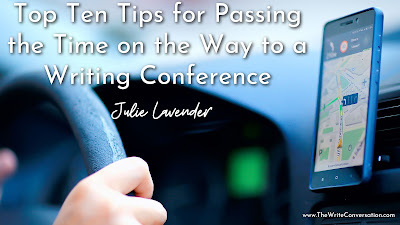
by Julie Lavender @JLavenderWrites
Do you have a hard time being idle or is this just me?
I recently returned from a writers conference that required an almost-seven hour drive through back country roads—and the speed limit on most of those county roads topped out at a whopping forty-five miles per hour! Because I’d attended this conference before, I knew the arduous journey ahead of me. Therefore, I left my house prepared to multitask—safely—on my trek.
The night before I left, I downloaded a couple of writing classes from a previous writers conference, downloaded a children’s chapter book, wrote (in large print on a sticky note) the names of conference speakers, and made sure the Bible app on my phone worked properly.
The next morning, with my car completely packed, I plugged in my phone and typed in the conference center’s address. I stuck the list of speakers on the corner of my car’s GPS screen. Then I set out on my journey with ten ideas for passing the time on the drive.
If you’re headed to a writers conference soon, (safely) employ some of these tips on the long drive. These same tips can also work for a day of air travel to a conference.
1. PRAY
I typically prayer-walk daily in the morning before I jump into writing, errands, or household projects. When I know I’m going to be in the car for a long time alone, I save my prayer time until I depart. I love to pray on a long car ride, talking aloud to God, pouring out my praise, and lifting up my requests.
2. PRAY for conference speakers and staff
I pray for writers almost every day. I pray in general, but I also lift up many of my writer friends by name and need. On the way to a conference, I spend a long time praying for attendees, speakers, faculty and staff, schedules, and the hopes and dreams of all those involved. I can quickly glance at the list of names on my sticky note to help me remember to pray for conference faculty and staff specifically. If I’m on faculty, I ask the Lord to guide my words to bless those whom I come in contact with.
3. PRAISE
After my prayer time, I focus on my surroundings with the intention of offering God praise for His creations and thanksgiving for the manmade objects around me. (On this particular trip, I had to come to a complete stop—twice—to allow half a dozen goats and then a turkey to cross the road.)
4. LISTEN to Scripture on an audio Bible
After my prayer and praise time, I pulled over long enough to pull up my Bible app. I listened to my Scripture reading for the day as the miles sped by.
5. LISTEN to an audio book
On my next pullover, I hit the button to listen to several chapters of a favorite middle grade novel.
6. CALL writer friends you haven’t seen in a while
Using Siri and working hands-free, I called several writer friends I’ve met at other conferences, ones that couldn’t make it to the one I was heading to, and caught up on life.
7. CALL your mom
Again, safely and hands-free, I called Momma to check in and make plans for errands together when I returned.
8. BRAINSTORM
Using the touch screen on my car’s dashboard and with Siri’s help again, I sent texts to myself about possible articles I hoped to write soon.
9. PLAN the week’s menu for after you return from the conference
Safely and hands-free, I sent texts to myself with meal ideas and grocery notes.
10. LISTEN to praise and worship songs
With the few minutes of time I had left after completing all of the activities above, I used the scan and seek buttons on my steering wheel to find a Christian station to enjoy praise and worship music.
Obviously, all my tips come with a warning to employ with the utmost safety precautions while traveling by car or in the air. If you have other suggestions, ones I might try on my next writers’ conference road trip, please share them below. I’d love to know how you pass the time away on the way to a conference.
TWEETABLETop Ten Tips for Passing the Time on the Way to a Writing Conference from @JLavenderWrites on @EdieMelson (Click to Tweet)
 Julie Lavender is excited that her children’s books release this fall, a children’s picture book with End Game Press and four educational children’s books co-authored with her husband. She’s also excited about the release of two books since October: the bilingual edition of her award-winning, Amazon bestselling, Children’s Bible Stories for Bedtime; andStrength for All Seasons: A Mom’s Devotional of Powerful Verses and Prayers.
Julie Lavender is excited that her children’s books release this fall, a children’s picture book with End Game Press and four educational children’s books co-authored with her husband. She’s also excited about the release of two books since October: the bilingual edition of her award-winning, Amazon bestselling, Children’s Bible Stories for Bedtime; andStrength for All Seasons: A Mom’s Devotional of Powerful Verses and Prayers.
Published on April 10, 2024 22:00
April 9, 2024
6 Things to Keep in Mind As You Begin Writing Articles
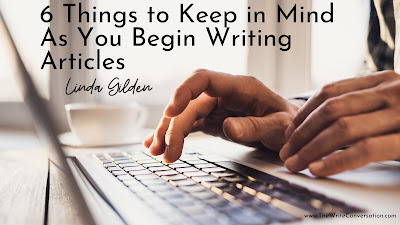
by Linda Gilden @LindaGilden
As a fulltime freelance writer, people are often surprised when I say I love to write articles. “Articles?” they say. “How did you learn to do that? Why do you want to write articles?”
When I hear that I am amazed. I cut my writing teeth on articles. They were shorter therefore my research took less time. I could write on many different subjects and learn about things I never knew existed. In fact, when I started out the idea of writing an entire book was overwhelming because I had small children who were not nap lovers.
There are a few things to keep in mind as you start writing articles.
1. Just because articles have less words, you should not relax your writing style. Always write with excellence and present the editor the best writing you can.2. If you are researching a book, you can write articles using your research as you are writing. This establishes you as an expert in your field and people will be looking for the release of your book. 3. Articles are a great way to create additional income from your material. There are thousands of publications and websites out there looking for material. Why not create a new stream of income from your research? For many people, the pay per word for articles exceeds the pay per word of a book.4. When submitting a book proposal, one of the first things the publisher looks at is your platform. Are you established in your field? Do you have a large realm of influence? Does your passion support the subject of your book? Articles can help you build and sustain your platform.5. Once you have a book published, articles are a great marketing tool. However, don’t write articles encouraging people to buy your book. Don’t summarize your entire book. Pick one story or issue from your book. Write an article about that. You don’t need to mention your book in the article. In your bio, mention you are the author of the soon to be released book, NAME of BOOK. Also include your website where they can go learn more about you and your book.6. Writing articles will give you a solid way to build “clips” that will help you create your portfolio. Often publishers will ask for samples of your work and if you have written a lot of digital material, you can just send them a link, which will let them know what kind of websites you like to write for. This will give you a good sampling of your work, and the types of articles you can share with their readers as they explore whether or not your writing is a good fit for their publication.
Articles connect you to many different sources. As you build a following, you are building readership. Each publication has a different set of readers who also have friends. If each publication’s readership looks for your book in a bookstore, you will create quite a buzz.
Do you have some creative ideas you can share with our readers? Perhaps you have a good market to start with for articles. Or maybe you know of a new market that is searching for writers. Article writing is a great side hustle for writers and we need to be searching for new markets all the time.
TWEETABLE6 Things to Keep in Mind As You Begin Writing Articles from @LindaGilden on @EdieMelson (Click to Tweet)
 Linda Gilden is an experienced, bestselling writer, speaker, award-winning editor, marketer, and speaking coach, ghostwriter, and writing coach. Author of 40 books and 2,000+ magazine articles, Linda appreciates a great story. She believes with our stories, we can change the world one word at a time and loves to encourage others to do that through writing coaching and personal tutoring. Her newest book was released in November: TRADING SHADOWS: EXCHANGING A LIFE OF SECRETS, FEAR, AND DOUBT FOR A LIFE OF FREEDOM WITH THE ALMIGHTY.
Linda Gilden is an experienced, bestselling writer, speaker, award-winning editor, marketer, and speaking coach, ghostwriter, and writing coach. Author of 40 books and 2,000+ magazine articles, Linda appreciates a great story. She believes with our stories, we can change the world one word at a time and loves to encourage others to do that through writing coaching and personal tutoring. Her newest book was released in November: TRADING SHADOWS: EXCHANGING A LIFE OF SECRETS, FEAR, AND DOUBT FOR A LIFE OF FREEDOM WITH THE ALMIGHTY.
Published on April 09, 2024 22:00
April 8, 2024
Finding Your Writing Way

by Cindy K. Sproles @CindyDevoted
Being raised in the mountains of East Tennessee, I didn’t have access to a great choice of classes in high school. Many small county school systems were and still are financially challenged, so these writing classes simply were not a part of the school curriculum. Schools inside the cities have a greater financial advantage over smaller county schools that don’t have access to additional tax funding that provides a greater school curriculum.
When I attended my first conference, I had no idea about POV (Point of View) or even what it was. I didn’t have a clue about plotting, description, or voice. I knew basic English. I’d never had a deeper exposure to the writing world because our schools just didn’t offer those types of classes.
There were so many wonderful folks who kindly educated me on writing as a career at conferences. I will always be grateful for their help in helping me understand the steps of writing for publication.
Conferences are wonderful places. They give us an opportunity to meet other like-minded people who love the craft of writing. Conferences give us hoards of learning, tons of ideas, and truckloads of information to process. Let’s face it. Conferences are super places, and it’s one reason you should take the time to encourage interested newbies to attend.
I was recently at a book signing in Knoxville, TN, when a young woman came up and began to chat. I eventually found out she was writing but had no direction. The closest conference to her that fit into her work/school schedule was the Carolina Christian Writers Conference. I immediately fed her the information and guess what? She attended. That conference was her first real writing experience.
There is so much to learn about the craft of writing, and it’s up to us to share those things with other writers. At the risk of sounding contradictory, “a writer does not a teacher make.” So, what exactly does that mean?
It can be an assortment of things. To the conferee’s advantage, directors vet their teachers. Most host faculty that are multi-published in the traditional publishing world or who have the credentials to offer private editing and mentoring. Publishers who attend are well-versed in the industry, and most have years of publishing, editing, and writing experience under their belts. Conferees can trust that those who are tasked with teaching and taking appointments have the experience and knowledge to assist up-and-coming writers.
What this means is you, as a conferee, always do your homework when it comes to hiring unvetted individuals to help you with your work. More times than not, this goes array when a conferee hires another conferee to edit. They may assume they will receive a content edit when what they end up with is a comma queen. I’ve had conferees tell me they hired another conferee who sat next to them to do editing. That person told them they could edit. After paying them in advance, the conferee who hired this person, never got the first edit. Do your homework on individuals. Ask for references, and do not pay upfront because as much as we’d like to think that dishonesty or lack of integrity doesn’t exist in the Christian Conference world, it does. Be wise before you hire work done.
Anyone can write a piece that looks nice and might be published in the church newsletter, but that doesn’t make that person a qualified editor. Again, always do your homework.
Learn to listen to your faculty. Trust that they are guiding you with experience and knowledge. The first thing you will hear faculty members say is to learn the craft. That is, first and foremost, why you attend a writing conference. The rest is a progression. Learn the craft. Write. Improve. Complete a manuscript. Seek an agent. Seek publication. This line of progression that, when followed, grows you as a writer and protects your heart from huge disappointment. You won’t be published until you have work completed that is of publishable quality. It takes time to learn the craft.
We can rush a project into a one-sheet, present it to a publisher, and even get a nod to send the manuscript, but have no completed manuscript, there is nothing to publish, and an opportunity passes by you like a vapor. Writing is a process that is both joyful and frustrating. It’s a long, drawn-out process that, when done well, has earned every minute it’s taken. Be patient. Don’t rush. Do your best work and bring it to fruition, then seek an agent and publication. This industry demands time.
Come to a conference ready to learn. Soak in all you can. Share what you’ve learned with others and help those who are just starting the journey. Though the writing industry has limited slots for publications, it doesn’t mean you aren’t good enough. It simply means you keep writing, editing, learning, and know that the right moment will come for you. Seek out that wonderful Christian Writers Market Guide , and the opportunities will pour out of the pages.
We’ll see you soon at the Blue Ridge Mountains Christian Writers Conference .
TWEETABLEFinding Your Writing Way, wisdom from author @CindyDevoted on @EdieMelson (Click to Tweet)
 Cindy K. Sproles is an author, speaker, and conference teacher. Having served for a number of years as a managing editor for Lighthouse Publishing of the Carolinas and Ironstream Media, Cindy now works as a mentor, coach, and freelance editor. She is the co-founder of Writing Right Author Mentoring Services with Lori Marett and she is the director of the Asheville Christian Writers Conference. Cindy is also the co-founder of Christian Devotions Ministries and WWW.CHRISTIANDEVOTIONS.US, as well as WWW.INSPIREAFIRE.COM. Her devotions are in newspapers and magazines nationwide, and her novels have become award-winning best-selling works. She is a popular speaker at conferences and a natural encourager. Cindy is a mountain girl, born and raised in the Appalachian mountains, where she and her husband still reside. She has raised four sons and now resorts to raising chickens where the pecking order is easier to manage. You can visit Cindy at WWW.CINDYSPROLES.COM or www.wramsforwriters.com.
Cindy K. Sproles is an author, speaker, and conference teacher. Having served for a number of years as a managing editor for Lighthouse Publishing of the Carolinas and Ironstream Media, Cindy now works as a mentor, coach, and freelance editor. She is the co-founder of Writing Right Author Mentoring Services with Lori Marett and she is the director of the Asheville Christian Writers Conference. Cindy is also the co-founder of Christian Devotions Ministries and WWW.CHRISTIANDEVOTIONS.US, as well as WWW.INSPIREAFIRE.COM. Her devotions are in newspapers and magazines nationwide, and her novels have become award-winning best-selling works. She is a popular speaker at conferences and a natural encourager. Cindy is a mountain girl, born and raised in the Appalachian mountains, where she and her husband still reside. She has raised four sons and now resorts to raising chickens where the pecking order is easier to manage. You can visit Cindy at WWW.CINDYSPROLES.COM or www.wramsforwriters.com.
Published on April 08, 2024 22:00
April 7, 2024
Every Writer Can Benefit From a Personal Publishing Plan
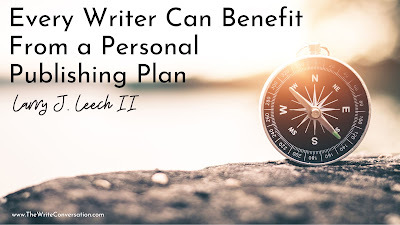
by Larry J. Leech II @LarryJLeechII
One sunny day I sat on my couch and decided to take a trip. I figured I would just jump into my vehicle, head out onto the highway, and see where I might end up.
After hours and hours of driving, ignoring road signs, and ultimately in need of gas, I had no clue where I was or how I got there. What I thought would be a good idea of taking a trip without any planning became a nightmare that I hope to never repeat.
And the same applies to writing.
Embarking on what could be a wonderful writing journey without a plan certainly will lead to disaster. Even if planning is not your forte, I highly recommend you put together a plan that will help you stay on course. Or let something slip through the cracks.
If you haven’t discovered by now, writing is a business. And every successful business needs a plan. Every writer’s plan will be different.
In my years of writing, editing, coaching, teaching, I have learned being a juggler is important. Like others, my “to do” every day is long, and I’m constantly juggling multiple projects and deadlines at one time.
For you, your list may look something like this:
Start or update a social media accountOr two Or threeStart or update your blogCreate or update your websiteUpdate a one sheetUpdate a book proposalMake minor revisions in your manuscriptMake major rewrites in your manuscriptThrow away manuscript and start overFind a writing coachFind an accountability partnerFind a writing groupBang head … on deskCry while banging headTake Tylenol for headacheTake a napWake up and go through list again
Wow, that’s a lot and may not be everything you need to do. Trying to handle all this without a plan will cause frustration, doubts, and likely some head banging.
So, quickly before this blog gets too long, let’s break down one “to do” into smaller chunks. Let’s go with “make minor revisions in your manuscript.”
In doing so, you probably will need to:
Check for passive verbsCheck for overuse of exclamation marksEnsure subject-verbs tenses matchEnsure all dialogue and special words have beginning and ending quote marksCheck that the beginning of each chapter draws in the readerCheck that the end of each chapter makes the reader want to turn the pageCheck for progressive tenseCheck for unnecessary words / qualifiersRewrite clunky or unclear sentencesReview my Terrible 30That’s not an exhaustive list. You might have other issues to address, based on feedback from an editor, agent, accountability partner, or critique group. For each item on your list, assign a deadline. For instance, if your goal is to have the entire list completed by the end of April, you could assign a deadline of April 9 for “check for passive verbs” and “check for overuse of exclamation points.” Assign a makeable deadline for each to make your final deadline. Trying to get through this list in the week before your end-of-the-month deadline probably will drain your creativity and cause a lot of clinched fists and gritted teeth.
While you work through your “to do” list, you probably will work on other items that need done—update a website or social media, for example. For each item on your list, break it down in the fashion I explained for making revisions. The lists and deadlines will help you stay on course of what can be an exciting writing journey.
Oh, if you wondered how I returned safely from my disaster of a trip, don’t worry, no other drivers or animals were harmed in my fictitious adventure. All that took place in my head. I am a writer, you know!
TWEETABLEEvery Writer Can Benefit From a Personal Publishing Plan from @LarryJLeechII on @EdieMelson (Click to Tweet)
 Editor-in-Chief at Bold Vision Books and writing coach of award-winning authors, Larry J. Leech II has spent more than forty years writing and editing. He started his career as a sportswriter in southwestern Pennsylvania where he covered prep, college, and pro sports, including the Pittsburgh Pirates and Steelers.
Editor-in-Chief at Bold Vision Books and writing coach of award-winning authors, Larry J. Leech II has spent more than forty years writing and editing. He started his career as a sportswriter in southwestern Pennsylvania where he covered prep, college, and pro sports, including the Pittsburgh Pirates and Steelers. In 2004, after 2,300 published articles, Larry moved into the book publishing industry. Since that time, he has ghostwritten 30 books, edited more than 400 manuscripts, and coached hundreds of authors through the writing and publication process. You can find him online on Twitter, Facebook, and Instagram.
Published on April 07, 2024 22:00
April 6, 2024
He is Risen Writing
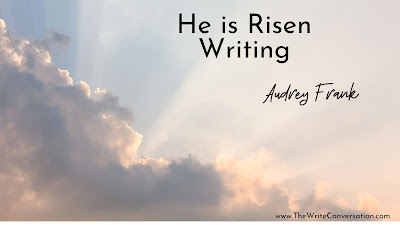
by Audrey Frank @AudreyCFrank
Mary Magdalene came and informed the disciples, “I have seen the Lord!” And she told them what Jesus had said to her(John 20:18).
One year ago, I had the honor of being a scribe for a group of people in the persecuted church who had escaped capture and imprisonment. My job was simple: write down what they reported about the ordeal.
I taped craft paper along a wall and listened for five long days as a counselor carefully led them through a debrief of the timeline, their emotions, and thoughts. Some days, I simply stood facing the wall immobilized, pen in hand, my back to the sacred group, weeping as they reported the faithfulness of Jesus.
They were no mere strangers. Many of them were people I love deeply. People with whom I have lived life large and joyful, walked through losses and births, celebrated the joys of children growing up, and wept through the sorrows of saying goodbye. Persecution had come home to us.
As they feared for their lives, trusted in God, and crossed borders in the dark holding the tiny trusting hands of grandchildren, they saw the Lord. And for one week, they told us what He said to them. I was simply a witness and a scribe, recording the glory of it all. The words did not need my crafting; they shone with the brilliance of nothing less than Resurrection morning.
Words given in the light of Resurrection are life words. They give life to the one who hears them, and that life is meant to be shared.
I love Jesus’ practice of giving to His own so that they may have something of worth to give to others. Then, as often is the case, others become His own also. And the cycle of Resurrection glory continues.
Jesus said to her, “Mary.” She turned toward him and cried out in Aramaic, “Rabboni!” (which means “Teacher”). Jesus said, “Do not hold on to me, for I have not yet ascended to the Father. Go instead to my brothers and tell them, ‘I am ascending to my Father and your Father, to my God and your God.’” Mary Magdalene went to the disciples with the news: “I have seen the Lord!” And she told them that he had said these things to her (John 20:16-18).
Jesus met Mary in her sorrow on Resurrection morning and called her by name. His instruction was simple: Go and tell the disciples what I have said.
The resurrected Lord has a habit of calling those He resurrects by name (see the story of Lazarus in John 11). Jesus was not the only resurrection on Easter. Mary’s hope also rose from the dead that morning.
Has Jesus called you by name? Many say that He speaks loudest at the graveside. Let us not be surprised if the graveside of our buried hopes is the place where we encounter the risen Savior and receive words for others.
Because Christ is risen, we have words to share.
Go, and tell them what He has said to you. This is the liberty of He is Risen writing.
TWEETABLEHe is Risen Writing from author @AudreyCFrank on @EdieMelson (Click to Tweet)
 Audrey Frank is an author, speaker, and storyteller. The stories she shares are brave and true. They give voice to those whose words are silenced by shame, the hard things in life that don’t make sense, and the losses that leave us wondering if we will survive. Audrey and her family have spent over twenty years living and working among different cultures and world views, and she has found that God’s story of redemption spans every geography and culture. He is the God of Instead, giving honor instead of shame, gladness instead of mourning, hope instead of despair. Although she has three different degrees in communication and intercultural studies, Audrey’s greatest credential is that she is known and loved by the One who made her.
Audrey Frank is an author, speaker, and storyteller. The stories she shares are brave and true. They give voice to those whose words are silenced by shame, the hard things in life that don’t make sense, and the losses that leave us wondering if we will survive. Audrey and her family have spent over twenty years living and working among different cultures and world views, and she has found that God’s story of redemption spans every geography and culture. He is the God of Instead, giving honor instead of shame, gladness instead of mourning, hope instead of despair. Although she has three different degrees in communication and intercultural studies, Audrey’s greatest credential is that she is known and loved by the One who made her.Audrey is the author of Covered Glory: The Face of Honor and Shame in the Muslim World (Harvest House Publishers), an outpouring of Audrey’s heart to introduce others to the God of Instead. Shame is not unique to the developing world, the plight of the women behind veils, young girls trafficked across borders; shame is lurking in hearts everywhere. Through powerful stories from women around the world, Covered Glory illuminates the power of the Gospel to remove shame, giving honor instead. Available at favorite booksellers: BARNES & NOBLE, BOOKS A MILLION, AMAZON.
Published on April 06, 2024 22:00
April 5, 2024
An Eclipse Inspired Perspective for Writers
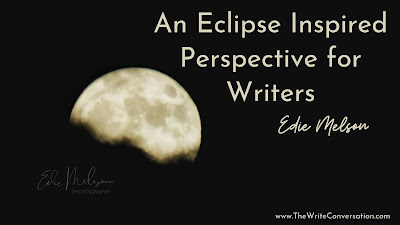
by Tim Suddeth @TimSuddeth
A solar eclipse is coming in a few days that will be visible to much of the eastern United States. I remember our last eclipse back in August 2017. We lived in the path of totality, where the moon blocks out all of the sun but a thin ring. (Doesn’t that sound like something out of sci-fi?)
My wife and I didn’t think much of the eclipse, so we didn’t make any special plans. For days, the newspaper had included events of groups gathering, but we hadn’t paid much attention. We didn’t see why we should go to any bother and planned to stay home, doing inside stuff.
Until I walked my dogs. I get a lot of ideas when I walk my two lovable pups. It was over an hour until the actual eclipse. The sky was clear, but it began to look and feel like twilight. At 1:30 in the afternoon.
I hurried home and, like the Beverly Hillbillies, we “loaded up the truck and headed to—” the nearest place to watch the eclipse with a crowd. In this case, at our veterinarian’s.
And I found it to be an incredible experience. We were standing outside in the parking lot wearing our ‘eclipse glasses’ (very chic). As well as the day growing darker, it was getting noticeably cooler. That’s astonishing anywhere in South Carolina in August. Even the birds had gotten quieter.
And we all stared upward in awe as the moon blocked out the sun.
As amazing as an eclipse is, it’s really an incredible magic trick God pulls. (He should sell tickets.) A ginormous illusion. Although the moon blocks out the sun, appearing to be equal in size, the moon is in fact 400 times smaller.
So, if the sun is so much larger, why do they look similar in size? It’s because of our perspective. Although the sun is 400 times larger than the moon, it’s also 400 times farther away from earth. (See what God did there? Pretty cool, huh? I bet he used a slide rule. (Sorry, old person’s joke. Like you didn’t know.))
It’s all in our perspective from where we are watching here on earth. When looking at the sun and moon from our perspective, their correct sizes become distorted.
Getting a false perspective also happens in our writing journeys. One area where we need to be careful to keep a proper perspective is when we consider whether all our effort is worth it. I would say that most writers set goals for themselves. I know I did. But when I started writing, I didn’t know what I was doing, what opportunities would come, or what I wanted to write. If I had set a goal to have my book on the shelves beside John Grisham’s in three years, I’d be disappointed. Did I have a book contract? No.
But I did have an article in Guidepost. And I found a community of like-minded writers who have helped me grow.
So, will I be a miserable failure, or a writer enjoying the journey that God has planned and placed before me? Perspective.
Keeping the right perspective has never been easy. Tennessee Williams admitted, “I don’t believe anyone ever suspects how completely unsure I am of my work and myself and what tortures of self-doubting the doubts of others has always given me.”
We are never fair to ourselves when we compare ourselves to others. Or when we determine our success and value by our perception of someone else. They always seem to write better, write faster, get the best agents, win all the awards, understand AI, have great hair, and have great penmanship. And the only response we can give them is to paste on our best fake smile and say “bless ‘em.” (I’m a southerner.)
Because really we shouldn’t be comparing ourselves to anyone else. God has created each of us uniquely with a specific path He has designed for us. Individually.
I used to argue about this. I could believe God loves us collectively, as His church. But individually? That was asking too much. Then I looked closer at the parable of the lost sheep. A sheep got out fence and the Shepherd left the 99 to find the one. The stinker that snuck away. Me.
So what eclipse is blocking your sight? Is it given you doubts that are making it harder for you to write? Or is it taking the joy out of your writing? In II Corinthians 10:5, Paul tells us to “take every thought captive.” Not to let them sneak in to steal our joy or hide the truth. To take care that our thoughts don’t mislead us.
From my yard on Monday, the moon is going to appear the same size as the sun, even though the sun is hundreds of times larger. Sometimes, the work that goes into the writing God has called us to seems to be too much. The truth is, we haven’t yet seen how God is going to use it. And us. Our church has just finished a study on the book of Revelation. I can tell you with complete confidence, the final chapter is pretty amazing.
TWEETABLEAn Eclipse Perspective for Writers from @TimSuddeth on @EdieMelson (Click to Tweet)
 Tim Suddeth is a stay-at-home dad and butler for his wonderful, adult son with autism. He has written numerous blogs posts, short stories, and three novels waiting for publication. He is a frequent attendee at writers conferences, including the Blue Ridge Mountain Christian Writers Conference and a member of Word Weavers and ACFW. He lives near Greenville, SC where he shares a house with a bossy Shorky and three too-curious Persians. You can find him on Facebook and Twitter, as well as at www.timingreenville.com and www.openingamystery.com.
Tim Suddeth is a stay-at-home dad and butler for his wonderful, adult son with autism. He has written numerous blogs posts, short stories, and three novels waiting for publication. He is a frequent attendee at writers conferences, including the Blue Ridge Mountain Christian Writers Conference and a member of Word Weavers and ACFW. He lives near Greenville, SC where he shares a house with a bossy Shorky and three too-curious Persians. You can find him on Facebook and Twitter, as well as at www.timingreenville.com and www.openingamystery.com.
Published on April 05, 2024 22:00
April 4, 2024
Genre Expectations: Writing Steampunk and Gaslamp
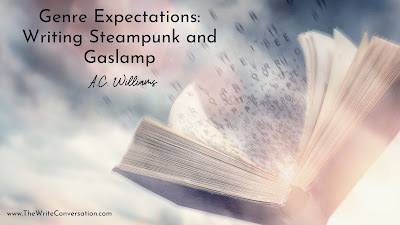
by A.C. Williams @ACW_Author
Have you ever wondered what it was like to ride an airship? Or maybe you have been curious about hoop skirts and corsets? Or perhaps you just like the aesthetic of gears, clocks, and antique metal as decorations?
If you have never explored the world of steampunk, you may already be lost. Gears? Clocks? What does any of that have to do with writing a novel?
For the next several months, we are tackling the topic of Genre Expectations, and one of the most intriguing genres in fiction is Steampunk. I’m sure you’ve heard of it, but you may not know what it is. Actually, you may have even heard of other types of “punks” like dieselpunk, cyberpunk, solarpunk, lacepunk, among many others. There are all sorts of punks these days.
But another genre has started popping up recently that’s similar to steampunk in its aesthetic, but as a genre it’s completely different in the elements readers expect from it. That genre is Gaslamp.
On the surface, Steampunk and Gaslamp seem identical. They are both driven by aesthetics. Characters wear top hats and corsets and hoop skirts and carry canes and use monocles. There’s usually some technology that doesn’t actually belong in a historical context, adjusted to be operated by some other power source than electricity. You’ll see clocks and pocket watches and gears and things of that nature all over the place.
But they aren’t the same. Actually, they don’t even originate from the same primary genres.
Let’s start with Steampunk.
Steampunk is a subgenre of science fiction, so at its core the genre is driven by technology or discovery on some level. In most instances, steampunk stories are set in the Victorian Era. However, they are not limited to England at that time. One of the best-selling steampunk series on the market is The Clockwork Century by Cherie Priest, which takes place during the Victoria Era but in America.
One of the books in this series, Boneshaker, is a fantastic example of the steampunk genre, featuring elements of steam-powered technology, scientific reasoning for the obstacles the characters encounter, and the fascinating complexity of an alternate history.
Steampunk books obviously include a story beyond the technological focus on the genre elements. For example, the main story in Boneshaker is a mother’s search for her son who is lost and trapped on the other side of a protective wall. But in order for the main character to achieve her goal, she must make use of the technology she has available. That includes airships and all sorts of other steampunk-genre essentials.
Steampunk looks at the past and asks what the world would have looked like if technology had advanced more quickly with steam power rather than electricity.
So what about Gaslamp?
Gaslamp (sometimes called Gaslamp Fantasy or Gaslight Romance), on the other hand, looks at the past and asks what the world would have looked like if magic or supernatural elements existed in society.
Gaslamp did not originate in science fiction; it is a subgenre of historical fantasy, which already sets it up to have a completely different purpose than steampunk (you’ll recall the difference between space opera and science fantasy that we talked about last month).
Granted, gaslamp shares many aesthetic similarities with steampunk and they usually take place during the same historical era, but the driving core of gaslamp fantasy stories is different than steampunk. While steampunk focuses on exploring science or discovering new technologies, gaslamp approaches the unknown as something that doesn’t need to be explained.
Gaslamp accepts the unknown as something that simply exists and has to be understood without being able to explain it. This is how many gaslamp stories can include magical elements or supernatural/paranormal elements.
For many years, I labeled the Parasol Protectorate series by Gail Carriger (the first book is called Soulless) as steampunk because I didn’t know what else to call it, but now that I’m more familiar with the idea of gaslamp, I can pretty confidently say that’s what it actually is.
The Parasol Protectorate features vampires and werewolves as major characters, alongside airships and top hats and corsets. But there’s no attempt to explain how paranormal creatures came about. They are simply part of society.
The gaslamp genre makes use of fantasy elements that don’t need to be explained. They don’t have to be possible; they are magical or fantastical. The steampunk genre includes fantastical elements but always incorporates a reason how they exist within the context of the storyworld. Monsters were created by science or influenced by a chemical reaction (this is what happens in Boneshaker). There’s no magic involved.
So if you have a fondness for Victorian aesthetics and a love for alternate timeline stories, you might consider writing either steampunk or gaslamp. Just make sure you know the difference between the two!
TWEETABLEGenre Expectations: Writing Steampunk and Gaslamp from @ACW_Author on @EdieMelson (Click to Tweet)
Don't Miss the Previous Posts in This Series1. Writing Romantic Fantasy and Fantasy Romance2. Writing Fantasy and Space Opera3. Writing Steampunk and Gaslamp
 Award-winning author, A.C. Williams is a coffee-drinking, sushi-eating, story-telling nerd who loves cats, country living, and all things Japanese. She’d rather be barefoot, and if she isn’t, her socks won’t match. She has authored eight novels, two novellas, three devotional books, and more flash fiction than you can shake a stick at. A senior partner at the award-winning Uncommon Universes Press, she is passionate about stories and the authors who write them. Learn more about her book coaching and follow her adventures online at https://www.amycwilliams.com.
Award-winning author, A.C. Williams is a coffee-drinking, sushi-eating, story-telling nerd who loves cats, country living, and all things Japanese. She’d rather be barefoot, and if she isn’t, her socks won’t match. She has authored eight novels, two novellas, three devotional books, and more flash fiction than you can shake a stick at. A senior partner at the award-winning Uncommon Universes Press, she is passionate about stories and the authors who write them. Learn more about her book coaching and follow her adventures online at https://www.amycwilliams.com.
Published on April 04, 2024 22:00



